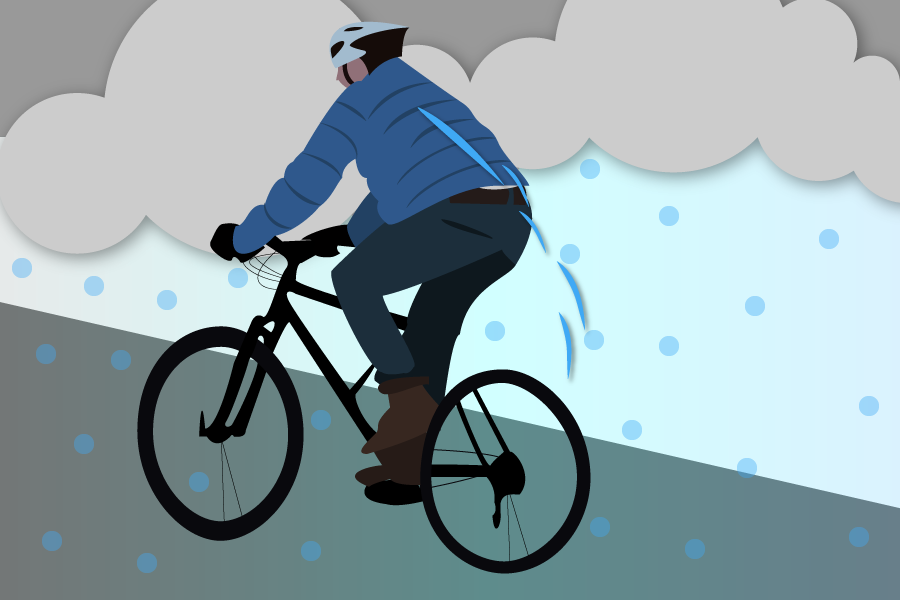
Police chief provides information about safety, Unitrans asks riders to remain patient throughout delays
A deluge of winter rain recently hit the UC Davis campus — in the period of Jan. 1 to Jan. 18, 7.83 inches of rain were measured in the nearby Sacramento Executive Airport according to the National Oceanographic and Atmospheric Administration (NOAA).
Large amounts of rain pose a particular set of challenges for campus management and students, especially when it comes to maintaining safety. According to Interim UC Davis Police Chief Jennifer Garcia, the most important part of remaining safe is planning ahead.
“Check the weather before leaving [for campus], especially if you are going to be gone all day,” Garcia said. “For students, you leave your home in the morning and you don’t go back until the evening or sometimes late in the evening. Check the weather throughout the day. It might be really sunny and bright in the morning but by the evening it’s torrential floods.”
Even in the rain, police officers have to be ready to respond at a moment’s notice. Garcia encourages students to make use of police officer’s weather preparation methods.
“One of the things we like to encourage officers to do is to have what we call a ‘go bag,’ in a case like this when we are experiencing flooding […],” Garcia said. “In a ‘go bag,’ you have extra socks, extra clothes, your toiletries, any medications you might need, jammies, snacks, a couple bottles of water — to have that in your car at all times. I suggest that for everybody in times of severe weather.”
According to Garcia, a lot of work related to winter weather, especially flooding, falls onto UC Davis Facilities Management.
“What we do for severe weather is we do rely on Facilities [Management] to supply sandbags if needed, and they would be the response to areas on campus that are flooding as far as if we need to divert the water or pump out the water of a basement,” Garcia said. “We would work with Safety Services risk management if there was a major problem on campus.”
Garcia also advised students to take extra caution when biking during severe weather.
“Wear some sort of reflective gear, because when it’s darker out it’s harder to see people,” Garcia said. “Also your peripheral vision is very important when you are driving and/or on a bike and even walking. So you want to make sure that your headgear, even though you’re trying to keep yourself really warm, you’ve got to make sure that your peripheral vision is really clear.”
This extra caution when driving also applies to Unitrans drivers. According to Amelia Bizjak, the operations manager for Unitrans, bus drivers must take extra precautions to maintain safety.
“Logistically, the rain provides an extra challenge for our drivers, similar to how driving in the rain in a car is more difficult,” Bizjak said via email. “Like in a car, vision is reduced and in order to be safer drivers need to go slower. There are also many more cars on the road, as people who would normally bike either switch to driving their own car or riding the bus.”
In addition to having to drive much more attentively, drivers also face the challenge of increased ridership on buses.
“A lot of people who ride their bikes switch to alternative methods of getting around Davis on stormy days, and Unitrans is the alternative for a good number of people,” Bizjak said via email. “Our buses tend to be a lot more packed on rainy days as a result.”
Because of increased ridership, late and crowded buses are the most common complaints during rainy weather. Bizjak wants to assure riders that Unitrans does everything it can to keep the system running smoothly.
“When the weather is more severe we tend to get more concerns about lateness or being passed up at stops than in the more mild weather,” Bizjak said via email. “As mentioned before, the increased ridership and hazardous conditions tend to make our buses run late, and we are always very sorry to inconvenience our passengers who are trying to reach their destinations in a timely manner […] All of our drivers work hard to ensure we can provide safe transportation on a daily basis in rain or shine to the City of Davis.”
For Ariana Camarena, a first-year environmental policy major, the biggest challenge on stormy days is the decrease in morale to face the day.
“It usually just makes me want to stay in my dorm and not really go outside,” Camarena said. “Even though I do have class, I have to force myself to go. Whereas days where there is nice weather, I am kind of more encouraged to go because you can dress nice and look nice.”
Camarena’s experiences in the rain have taught her how to prepare for such weather.
“I have to wear a lot of layers: three layers of jackets, a scarf, an umbrella and my rain boots,” Camarena said. “It’s a lot more of a process. And you have to deal with locking your bike, so that takes like longer. It’s a hassle.”
Written by: Kenton Goldsby — campus@theaggie.org




